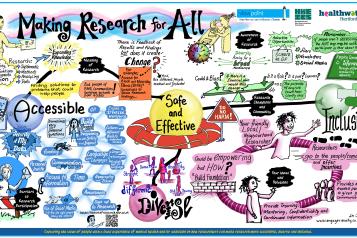Improving Health Outcomes for people with a Learning Disability

Background
Research has shown that people with learning disabilities have a lower life expectancy and poorer physical and mental health outcomes compared to the general population. To address these health inequalities, Annual Health Checks were introduced with the purpose of reducing premature mortality and improving the health of people with learning disabilities.
Our approach
In total we engaged with 491 service users, carers and support workers:
- We spoke to 138 people at local Learning Disability Forums
- 353 people completed our questionnaire – either online or via hard copy
- Of the 353 people who completed our questionnaire – 20% were aged 14-17 years old
Of the respondents who completed the questionnaire, 69% (242) have had an Annual Health Check since May 2017 and 31% (111) have never had an Annual Health Check.
Key findings included:
- For those who have had an Annual Health Check, positive experiences reflected the friendliness and patience of clinicians. However, concerns were raised regarding the quality of Annual Health Checks
- Issues regarding quality related to the length of appointments offered, impacting on the comprehensiveness of the Annual Health Check
- That few GP practices provided information in an easy read format and/or communicated with service users in a way that is accessible for them
- Some GP practices did not allow service users to bring support with them and in some cases, staff in supported living accommodation refused to accompany service users
- Where respondents have not had an Annual Health Check, this is largely because they were not aware Annual Health Checks existed and/or because they have never been offered one by their GP practice
- A smaller number of respondents questioned the importance of having an Annual Health Check, or found that barriers such as time or confidence prevented them from attending
- Those aged 14-17 years old were less likely to have an Annual Health Check. For those who have, they were given greater choice in terms of appointment times and choice of clinician


